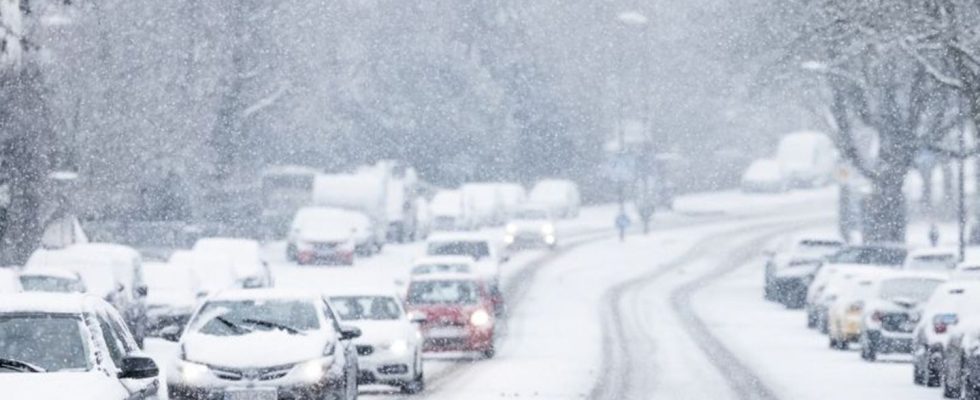ice and snow
Winter weather slows down traffic in parts of Germany
Cars make slow progress in Cologne city center in the thick snow. photo
© Rolf Vennenbernd/dpa
Partly extreme black ice and lots of snow: the winter weather is causing problems for many regions. Layers of ice form on the streets and planes can no longer take off in Frankfurt for a time.
Meteorologists warned of a partly extreme storm situation: snow and black ice, especially in the middle and south Germany’s everyday life is affected by many people. Streets and sidewalks were dangerously slippery.
Some schools remained closed or at least forewent face-to-face teaching. No planes took off at Frankfurt Airport due to freezing rain. The winter weather also slowed down rail traffic in parts of Germany. Local bus services were stopped in many places, and thick layers of ice formed on parked cars in some places. There was one death on a slippery road in the Eifel.
With a view to extreme black ice, the German Weather Service (DWD) gave the all-clear on Wednesday evening. “At the weekend we can look forward to cold winter weather with sunshine,” it said.
Weather service recommends: Avoid driving
Because of the risk of extreme black ice and also snowfall, the weather service had issued severe weather warnings for many regions in central and southern Germany, and driving by car was sometimes advised against. A van driver was killed in an accident on a slippery road in the Eifel. The 34-year-old drove his vehicle off the road in a curve near Bauler (Rhineland-Palatinate) and crashed into a tree, the police in Bitburg said. The man died at the scene of the accident.
In Saarland alone, the police had already counted more than 100 traffic accidents around midday. On the icy A8 near Karlsbad in the Karlsruhe district of Baden-Württemberg, a driver escaped with minor injuries when she lost control of her car and the car rolled over.
In Rhineland-Palatinate, the Trier police reported a traffic jam on the A64 because the neighboring country of Luxembourg no longer allowed heavy traffic in – the trucks were backed up and were redirected to parking spaces. The winter weather also caused problems for the border region in France. There were accidents and traffic disruptions in Alsace and Lorraine, and trucks were banned from driving on main traffic axes.
Due to the traffic situation, schools remained closed in some places, for example in Darmstadt. The city explained that they do not want to expose students to unnecessary health risks on the way to school and also reduce the volume of traffic in the city “in order to defuse the situation for the fire department, emergency services and hospitals.”
Airplane takeoffs suspended
Air traffic was also affected. Due to freezing rain, aircraft take-offs at Germany’s largest airport in Frankfurt were temporarily suspended on Wednesday afternoon. The operator Fraport justified this by saying that the machines could no longer be safely de-iced before take-off due to persistent freezing rain. In any case, hundreds of flights had already been canceled in Frankfurt.
In view of the decreasing rainfall, individual aircraft have been able to take off from Frankfurt Airport again since Wednesday afternoon. This is likely to ease the situation with available parking positions somewhat, a Fraport spokesman told dpa
Winter weather slows down rail traffic
Rail traffic in parts of Germany was also severely hindered. A spokeswoman for Deutsche Bahn (DB) said in the afternoon that there were delays and cancellations in regional and long-distance transport. Bus and rail replacement services are also severely restricted in some regions due to the formation of black ice. As a precautionary measure, the railway limited the maximum speed of its ICE trains to 200 km/h on Wednesday. This would cause further disruption nationwide. A number of ICE connections from Frankfurt or Stuttgart to Paris were completely canceled.
Storms are followed by “best skiing and tobogganing weather”
According to the DWD, the reason for the severe weather situation was a sharp air mass boundary over the middle of Germany, which separates cold air in the north from very mild sea air in the south. The weather service expects things to ease by Thursday.
According to meteorologists, the air mass boundary including precipitation will shift southward during the night, so that the freezing rain in the central parts of the country will gradually turn into snow. As the day progresses, the precipitation is expected to turn into snow again in the south. “In the north and the center the sun is increasing and we can look forward to the best skiing and tobogganing weather in the central low mountain ranges,” it said.
Winter sports enthusiasts will be happy to hear it – for example in the winter sports areas in Sauerland. In the past cold days, the snow cannons in Winterberg, for example, could have produced a lot of technical snow. If natural snow is added now, it would be ideal for the slopes, said the Winterberg ski lift carousel. “The conditions could hardly be better.”

